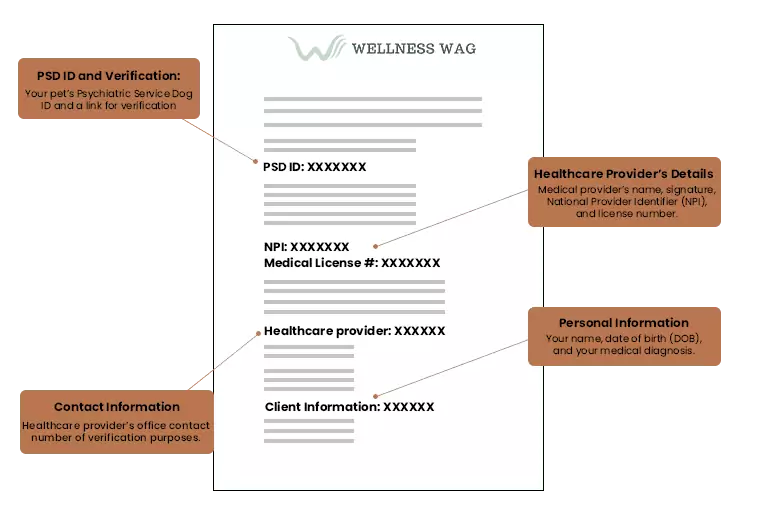How to Get a PSD Letter?
How to get a PSD Letter?


consult with an experienced doctor
we will match you with a licensed healthcare provider who will work with your directly.

obtain your official psd letter
get approved an receive your psychiatric service dog letter within 24 hours.
*Note: For California residents, California Law AB-468, effective January 1, 2022, requires a 30-day client-provider relationship before an ESA letter can be issued, resulting in a longer timeline than the typical 24 hours.
Qualifying Conditions for a Psychiatric Service Dog
Psychiatric Service Dogs (PSDs) are trained to assist individuals with a range of mental health conditions. Here are some of the qualifying conditions for obtaining a PSD:
- Post-Traumatic Stress Disorder (PTSD)
- Depression
- Anxiety Disorders
- Obsessive-Compulsive Disorder (OCD)
- Attention-Deficit/Hyperactivity Disorders
- Bipolar Disorders
- Social Phobias
- Schizophrenia
- Agoraphobia
- Claustrophobia
- Panic Disorders
- Autism
Where are Psychiatric Service Dogs allowed to Go?
Psychiatric service dogs are granted certain legal privileges under the Americans with Disabilities Act (ADA) in the United States. They can access to numerous locations, including public establishments such as:
- Restaurants
- Shops
- Hospitals
- Airports
- Schools
- Workplaces
How to Train a Psychiatric Service Dog?
Training a Psychiatric Service Dog is certainly no walk in the park. It requires careful planning, patience, and consistency.
Basic Obedience Training
Start with basic obedience commands such as sit, stay, come, and heel. This forms the foundation for more advanced training.
Socialization
Expose the dog to different environments, people, and situations to ensure they remain calm and well-behaved in various settings.
Task Training
Identify specific tasks that will assist the handler with their mental health condition such as providing deep pressure therapy during anxiety or panic attacks, retrieving medication or a phone in emergencies, interrupting harmful behaviors such as self-harm or repetitive behaviors, etc.
Positive Reinforcement
Use positive reinforcement techniques such as treats, praise, and play to reward desired behaviors. Consistency and patience are key to successful training.
Continued Training and Support
Training is an ongoing process, and regular practice and reinforcement are essential to maintain the dog’s skills. Get support from professional trainers or organizations specializing in service dog training if needed.
Your PSD Letter Contains the Following:
Money back Guarantee

If Your PSD Letter is not approved, we will refund 100% of your payment.

See what our happy Pet parents have to say…
Meet Some of Our Compassionate Care Team

Dr. Chance Miller, MD
Dr. J. Chance Miller, a native of Alabama, earned his B.A. in Spanish with minors in Biology and Chemistry from the University of Alabama at Birmingham. He was the captain of his rugby team during his time there. Dr. Miller obtained his medical degree from Columbia University College of Physicians and Surgeons in New York City, and completed his internship and at Washington University in Saint Louis.

Dr. Tasha Kornegay
Dr. Tasha Holland-Kornegay is a Licensed Professional Counselor and pet expert. She began her journey as an Animal Assisted Therapist to help her patients manage tricky, chronic mental health concerns like anxiety and depression using animals. Her expertise extends beyond traditional therapy, as she incorporates a holistic approach that considers the unique bond between humans and animals.

Dr. Stephanie White
I’m Dr. Stephanie White, a Licensed Clinical Social Worker with advanced training in counseling since 2002. Offering Teletherapy, I guide you through challenges with evidence-based care. Licensed in multiple states, including CA, NV, AK, HI, FL, and TX, I aim to promote self-sufficiency and transform lives through Grow. Start your journey to better mental health today!

Dr. Joel Durinka, M.D.
Dr. Joel B Durinka, MD, a renowned Family Medicine physician in Buffalo, NY, provides personalized healthcare. With extensive medical training, he ensures tailored care, prioritizing trust and open communication. Patients receive comprehensive care, and Dr. Durinka stays updated with medical advancements. He acknowledges the benefits of emotional support animals for patient well-being.
PSD Letter Walkthrough: Your Visual Guide to Comfort and Support
About Psychiatric Service Dogs


What is a psychiatric service dog?
A psychiatric service dog (PSD) is a type of service animal specifically trained to assist individuals with mental health disabilities. These dogs perform tasks that mitigate the effects of psychiatric conditions such as anxiety, depression, post-traumatic stress disorder (PTSD), and other mental illnesses. Tasks might include reminding the handler to take medication, providing deep pressure therapy during panic attacks, interrupting self-harm behaviors, or guiding the person to a safe place during episodes of dissociation or extreme anxiety.
Are emotional support animals considered psychiatric service dogs?
No, emotional support animals (ESAs) are not considered psychiatric service dogs. While both types of animals provide comfort and support to individuals with mental health conditions, their roles and training requirements differ significantly. Psychiatric service dogs are specially trained to perform specific tasks that directly assist their handlers with their disabilities. In contrast, ESAs provide general emotional support and companionship but do not require specialized training to perform specific tasks related to a disability.
What is the difference between an emotional support animal and a psychiatric service dog?
The primary difference between an emotional support animal (ESA) and a psychiatric service dog (PSD) lies in their training and the legal rights they are afforded. Psychiatric service dogs undergo extensive training to perform specific tasks that aid their handlers in managing their psychiatric disabilities. This training is specialized and tailored to the individual’s needs. In contrast, emotional support animals do not require specialized training to assist with specific tasks. Their role is to provide general emotional comfort and companionship.
Regarding legal protections, psychiatric service dogs are protected under the Americans with Disabilities Act (ADA), which allows them to accompany their handlers in public places where pets are typically not allowed, such as restaurants, stores, and public transportation. On the other hand, emotional support animals are not granted the same public access rights as psychiatric service dogs. However, they are protected under the Fair Housing Act (FHA), which allows them to live with their owners in housing units that have a no-pet policy. Additionally, while the Air Carrier Access Act (ACAA) previously provided certain protections for emotional support animals in air travel, recent changes have limited these rights, requiring most ESAs to travel as pets.
By clearly distinguishing between these two types of support animals, your website can provide valuable information to individuals seeking the appropriate assistance for their mental health needs.

Discover Wellness Wag
At Wellness Wag, we are a dedicated team of professionals committed to enhancing lives through the healing power of psychiatric service dogs (PSDs). With extensive experience in this sector, we have helped countless individuals find tranquility, comfort, and a revitalized sense of well-being through the companionship of a PSD.
Our mission at Wellness Wag is to provide reliable and accessible Psychiatric Service Dog Letter consultations. We aim to give individuals struggling with emotional and mental health issues the opportunity to experience the transformative impact of a PSD’s companionship.
We are dedicated to equipping our clients with the knowledge and resources needed to navigate this process with confidence and empathy. At Wellness Wag, we believe in the profound benefits that psychiatric service dogs can bring and strive to make these benefits accessible to all who need them.
Discover The Effortless Way To Get Your Legitimate PSD Letter With Wellness Wag

Complete Our Assessment
Take our quick assessment to tell us about your situation and emotional support needs, so we can tailor our services to your Psychiatric Service Dog.

Consult With Medical Physicians
After you submit the required forms, we’ll link you with a licensed medical professional for a personalized consultation and thorough evaluation to assess your eligibility for a PSD.

Receive Your PSD Letter
Upon confirmation by our team, you’ll receive a professionally crafted PSD letter with legal recognition within 24 hours of your consultation.
Wellness Wag offers a Money Back Guarantee to ensure a stress-free experience with your service dog.
If, for any reason, your legitimate PSD letter doesn’t work, we will refund your money in full.
Whether it’s because of non-qualification or illegal denial by your landlord, we’ve got you covered.
Our policy guarantees a 100% refund for two reasons:
Choose Wellness Wag for a smooth process guided by our trusted team of medical physicians.
Enjoy the positive impact of the PSD experience for you and your service dog.
*Note: For California residents, California Law AB-468, effective January 1, 2022, requires a 30-day client-provider relationship before an ESA letter can be issued, resulting in a longer timeline than the typical 24 hours.





















